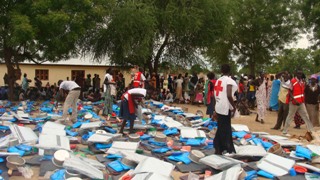Difficult conditions await Jonglei returnees
May 16, 2012 (BOR) – Mary Ayen left Port Sudan in May 2011 and reached Bor on July 18, 2011 but she is yet to get a plot to settle on or a shelter to cover her head and those of her five children. The same fate awaits 15,000 returnees Jonglei state is expected to receive in the next few weeks.

These women’s stories are just two of thousands of returnees in Bor; the capital of Jonglei State. As heavy rains have started, the living conditions there have deteriorated dramatically.
“I have no plot, there is no shelter and I need help from our government,” Ayen said. “There is nothing to start with,” she added.
So far, the South Sudan Red Cross Society had distributed non-food items to 1,000 households, according to officials. However many returnees say they have nowhere to put up the plastic tents or use the blankets.
An estimated 500,000 South Sudanese remain in Sudan after South Sudan succeeded last year. The Sudanese civil war, which displaced thousands, ended with the signing of the Comprehensive Peace Agreement (CPA) in 2005, promising South Sudanese a self-determination vote. The polls showed an overwhelming vote in favour of separation, leading to the declaration of South Sudan’s independence in July 2011.
The new country and international partners are still struggling to transport South Sudanese to their country. Upon reaching home, for many the living conditions are the same or worse.
Apajook returned to Bor with other villagers when cattle raiding and child abduction continued, despite South Sudan’s pledge to protect civilians after disarmament. Sharing a plot with relatives, Apajook erected a small tent supported by thin poles. When it rained the tent often collapsed or blew down she said.
“My husband is not here and I don’t know whether he is alive or dead,” she added.
The government of Jonglei state maintains that the insecurity has reduced in the state and people should return to their villages. However, reports of
cattle rustling including one of last week in Twic East county where two people died, remind villagers of the real threats in their homelands.
Jonglei state director of South Sudan Relief and Rehabilitation Commission, Deng Ajak, said that “plans are underway for their reception and reintegration” into communities.
Having stayed here for nearly one year, many returnees now wonder which communities they will be reintegrated into; those in towns where living conditions are already tough, or villages where there is poor security.
(ST)
